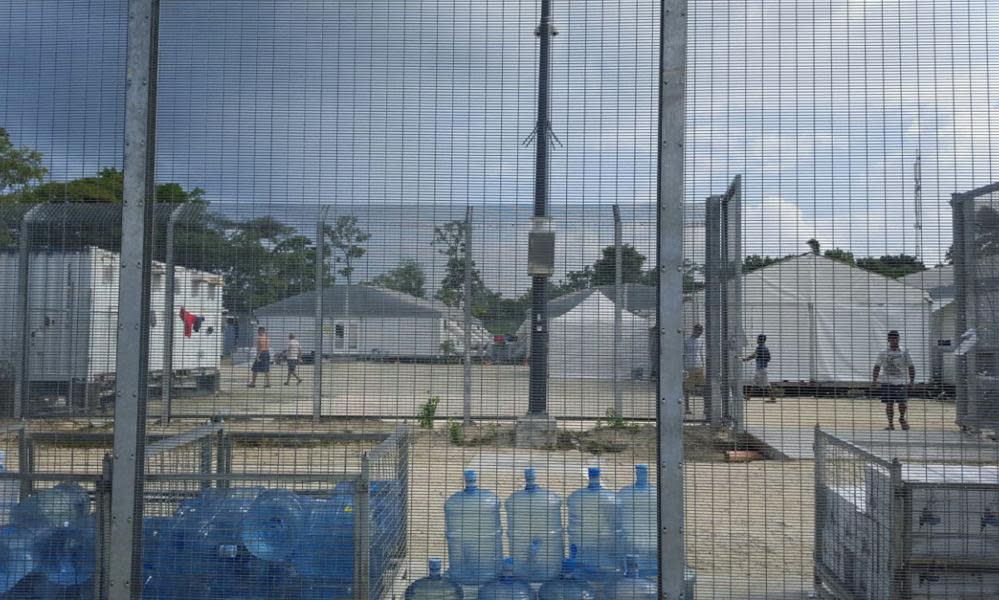UN and human rights groups condemn campaign to punish Manus Island men

Human rights groups and the UN have condemned Australia’s offshore processing regime as uncertainty surrounds the imminent closure of the Manus Island detention centre and the future of the 829 men held there.
In response to revelations in the Guardian that the Australian government and its contractors had engineered a year-long campaign to make conditions inside the detention centre more punitive in order to encourage refugees to leave, the Human Rights Law Centre and Amnesty International reiterated calls for Australia to abandon offshore processing.
Internal working documents from the detention centre revealed conditions for those held there would be made progressively more oppressive, in order to coerce people to accept resettlement in PNG or abandon their claims for protection, despite camp managers acknowledging refugees would face violence and danger in the community, were suffering severe mental health issues and had been institutionalised during four years in detention.
PNG and Australian government officials have announced that the closure of the Manus Island detention centre would begin this month. Demolition of the first compounds will begin on 28 May and all refugees and asylum seekers will be removed by 31 October.
The HRLC’s director of legal advocacy, Daniel Webb, who has travelled to Manus Island three times, said the revelations were further proof the Manus regime was deliberately designed to be harmful for the refugees held there.
“If settlement in PNG was a safe and viable option, it would have happened ages ago instead of using cruel tactics to force people down clearly unsafe roads.”
Webb said the “US deal” – under which America has agreed to consider resettling an as-yet-undetermined number of refugees from Australia’s detention centres – might only provide safety for some.
“It is our government’s responsibility to ensure safety for all,” he said. “The government has known for years that the Manus camp’s days are numbered, but it has never had a decent or humane plan for the innocent men trapped inside it.”
Amnesty International’s refugee coordinator, Graham Thom, said the internal working documents from the detention camp proved the Australian government had designed a deliberately abusive system.
“The leaked planning documents illustrate yet again just how far the Australian government is willing to go,” he said. “Instead of protecting vulnerable people, the government and its contractors have practised extreme abuse, wilful negligence and cruelty simply to make an example of them. It’s beyond belief.”
Amnesty released a report this week detailing a violent assault that occurred on Good Friday, during which “drunken soldiers” – in the words of the regional police commander – attempted to storm the detention centre, firing weapons into buildings where refugees and soldiers were hiding.
Coincident but unrelated, the UN’s special rapporteur on the rights of migrants, François Crépeau, has released a report of his visit to Australia last year.
Crépeau initially postponed his visit, out of fear that people who spoke to him about Australia’s migration policies and practices could be jailed under the Border Force Act. He ultimately did visit and was able to speak with workers in the system, as well as refugees and asylum seekers.
In his report, Crépeau wrote that Australia’s policies of treating boat-borne asylum seekers differently from those who arrived by plane was a clear breach of international law.
“The strong focus on securitisation and punishment blemishes the country’s good human rights record,” he wrote. “The special rapporteur observed that some of the country’s migration policies have increasingly eroded the human rights of migrants, in contravention of its international human rights and humanitarian obligations.
“The Australian authorities have put in place a very punitive approach to unauthorised maritime arrivals, with the explicit intention of deterring other potential candidates. Unauthorised maritime arrivals are treated very differently from unauthorised air arrivals, especially when they result in protection claims. This distinction is unjustifiable in international refugee and human rights law and amounts to discrimination.”
Crépeau said the use of offshore detention as a “deterrent” by the Australian government was unprincipled and unlawful.
“It is a fundamental principle of human rights law that one person cannot be punished only for the reason of deterring another.”
Crépeau’s report made more than 30 specific recommendations, including that Australia implement a bill of rights, “or at least a legislative guarantee of human rights – a human rights act – with a clause of precedence over all other legislation”.
The national president of the Australian Lawyers Alliance, Tony Kenyon, said Crépeau’s comments were a wake-up call to the status of human rights protections in Australia.
“Australia should guarantee that no one will ever again be subjected to the systematic inhumane treatment that arises in offshore detention, as has been revealed by so many reports and investigations,” Kenyon said.
“As Australia seeks election as a member of the UN Human Rights Council, it must demonstrate its commitment to respecting human rights by implementing the recommendations of UN experts.”
Australia is running against Spain and France for one of two seats on the influential United Nations Human Rights Council for 2018-2020.
Australia’s foreign affairs minister, Julie Bishop, is flying to New York this week to launch Australia’s candidacy for elections to be held in November. Australia is considered a solid chance – though not a certainty – to win a seat.
Human Rights Watch’s Australian director, Elaine Pearson, said Australia’s international reputation had been tarnished by offshore detention.
“At a time when the world is facing serious migration challenges, some diplomats from other countries are horrified by Australia’s approach to refugees,” she said. “Australia would have a better chance of winning the seat if it followed the recommendations of UN officials and experts to end offshore processing and the abuses that come with it.”
The Guardian contacted both Broadspectrum and the Department of Immigration and Border Protection regarding the planning documents. Both declined to comment.

 Yahoo News
Yahoo News 
